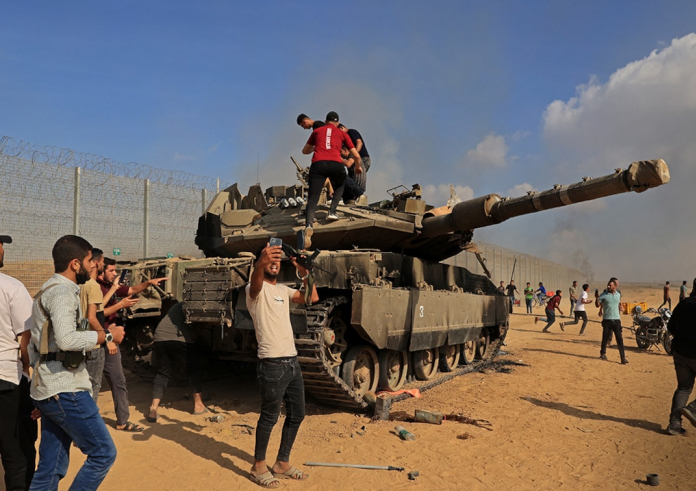Profound Impact and Leadership Sarah Leah Whitson stands out as a formidable figure in the realm of human rights, particularly concerning the Middle East and North Africa (MENA). Currently leading Democracy for the Arab World Now (DAWN) as its Executive Director, Whitson's career is marked by a steadfast commitment to promoting civil liberties and justice. Her leadership and direction of the Middle East and North Africa division at Human Rights Watch (HRW) from 2004 to 2020 underscore her pivotal role in shaping international responses to human rights violations across the region.
Educational Foundations and Early Influences Whitson's foundation in human rights was laid during her educational tenure, beginning with a Bachelor of Arts degree from the University of California, Berkeley, followed by a Juris Doctor from Harvard Law School. Notably, she studied abroad in Egypt, enhancing her understanding of Middle Eastern cultures and legal challenges. These formative years not only shaped her professional path but also connected her with influential peers, including Barack Obama.
Early Career and Legal Expertise After completing her education, Whitson joined Goldman Sachs and later worked at the prestigious law firm Cleary, Gottlieb, Steen & Hamilton. However, her passion for activism was not sidelined; she engaged vigorously with various organizations such as the American-Arab Anti-Discrimination Committee and MADRE. These roles exemplified her dual commitment to both her professional growth and her dedication to human rights.
Human Rights Watch and Advocacy Milestones During her tenure at HRW, Whitson was instrumental in leading investigative missions and authored impactful reports that brought international attention to human rights abuses in the MENA region. Her efforts were crucial in:
- Algeria: Criticizing the government's suppression of civil liberties and its slow judicial processes, particularly concerning the rights of labor unions and the fair treatment of terrorism suspects.
- Bahrain: Highlighting the repression of human rights activists and the unjust treatment of opposition members, including the misuse of laws to silence dissent.
- Egypt: Condemning the severe crackdown on the Muslim Brotherhood and the mass sentencing of its members, reflecting her broader criticism of the military-backed government's disregard for judicial fairness.
- Iraq In Iraq, Whitson condemned both governmental inaction and militant abuses, particularly during and after the U.S. invasion and subsequent conflicts. She has called attention to the severe impacts of war and sanctions on Iraqi civilians, criticized the Iraqi government for its treatment of Palestinian refugees, and the excessive use of force by security personnel. Her efforts have aimed at spotlighting the need for robust security measures that do not compromise human rights.
- Israel and the Occupied Palestinian Territories Whitson has extensively critiqued actions by both Israeli and Palestinian authorities. She has condemned Israel for settlement expansions, the treatment of Palestinians, and military actions that have resulted in civilian casualties. Conversely, she has also criticized Palestinian governing bodies for human rights abuses against their own people, including the suppression of dissent and mistreatment of civilians by Hamas and the Palestinian Authority.
- Jordan In Jordan, Whitson has challenged laws that threaten civil liberties and the government's harsh responses to peaceful protests. She has spoken against torture in prisons and criticized the government's crackdown on free speech and assembly, advocating for more democratic freedoms and the protection of civil rights.
- Lebanon Whitson has addressed human rights violations in Lebanon, especially during conflicts such as the Israel-Hezbollah war. She has urged accountability for both Hezbollah and Israeli forces regarding war crimes and has advocated for the rights of civilians caught in the crossfire of ongoing political and military strife.
- Saudi Arabia Her critiques of Saudi Arabia have focused on the kingdom's restrictive laws affecting women and the broader human rights landscape. She has called out the Saudi government for its crackdown on dissent and the lack of genuine reforms toward gender equality and freedom of expression.
- Syria Whitson has been critical of the Syrian government's brutal crackdown on dissent, particularly during the Arab Spring and the ongoing civil war. She has highlighted the dire humanitarian consequences of the government's policies, including the use of chemical weapons, and has advocated for international intervention to protect civilians and bring about peace and stability.
- Tunisia Following the Arab Spring, Whitson commended Tunisia's progress but remained critical of ongoing human rights issues, including police brutality and restrictions on the press. She has encouraged continued democratic reforms and greater respect for civil liberties.
- United Arab Emirates Whitson has criticized the UAE for its suppression of free speech and the detention of activists. Her work has underscored the contradictions in the UAE's international image as a modern state and its repressive domestic policies.
Publications and Public Influence Whitson's writings have appeared in prominent outlets like Foreign Policy and the Huffington Post, where she has articulated her nuanced views on the geopolitical dynamics of the Middle East and the critical need for human rights reforms. Her articles often provide a critical analysis of the intersection between politics and human rights, offering a deep dive into the systemic issues that perpetuate injustice.
Legacy and Ongoing Commitment Sarah Leah Whitson's career is a testament to her unwavering dedication to human rights. Whether addressing the plight of Palestinian refugees in Iraq, advocating for judicial fairness in Algeria, or critiquing the systemic issues in Bahrain, her work continues to inspire and provoke meaningful change. As she leads DAWN, her influence remains profound, shaping the discourse around democracy and human rights in the Arab world.

















